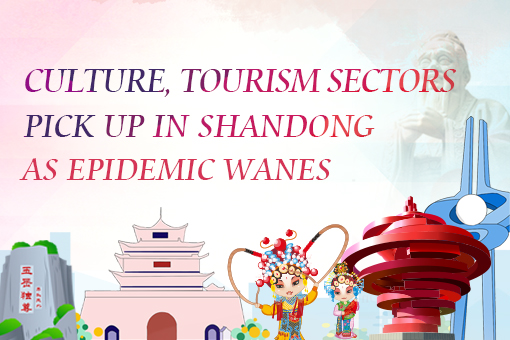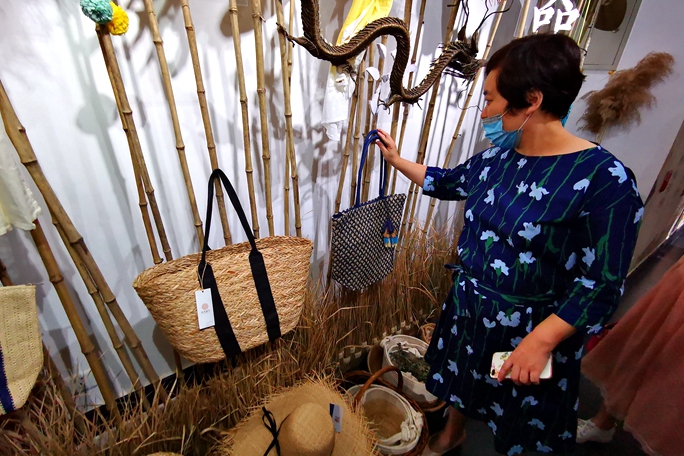Shandong pushes 'going-out' strategy of local culture
In recent years, Shandong has given full play to its advantages in cultural resources, actively integrating into the Belt and Road Initiative (BRI) and bolstering "big family" awareness in the Shanghai Cooperation Organization (SCO).
In 2017 alone, 67 cultural exchange groups consisting of 892 people visited foreign countries and China's Hong Kong, Macao, and Taiwan, 41 of which, involving 606 people, journeyed to BRI countries. A total of 427 foreign cultural exchange groups with 6,013 members visited Shandong.
The BRI seeks to amplify mutual recognition of civilizations and cultural exchange, as well as to bridge the hearts and minds of people from the different countries and regions involved.
Shandong is the birthplace of Confucius and Mencius and is the provenance of Confucianism. Located at the intersection of the Silk Road Economic Belt and the eastern end of the 21st Century Maritime Silk Road as well as that of Northeast Asia and the Bohai Economic Circle, Shandong shoulders an important mission in cultural communication and exchange.
"Shandong was the intersection and starting point of the two Silk Roads in ancient times. At that time, Shandong silk was sold both at home and abroad and became an important material carrier of the Qilu culture. Though regional, the Qilu culture is a representative of the Chinese culture that is not only national but also global. The Qilu cultural resources created an advantage for Shandong in the BRI establishment," said Wang Yuji, professor of history and culture at Shandong University.
Peaceful cooperation, openness, inclusiveness, mutual learning and benefit, and win-win outcomes lie at the core of the Silk Road Spirit.
The SCO was established for mutual trust, mutual benefit, equality, negotiation, respect for diverse civilizations, and common development; all elements at the nub of the "Shanghai Spirit".
The SCO countries are all important for China and are involved in the BRI, which is not only a highway for economic development but also one for civilizing factors building a community for the destiny of mankind.
Wang Tingqi, deputy director of the Shandong provincial department of culture, said that countries involved in the BRI are numerous and their civilizations, religions, ideologies and cultures are colorful and complex.
He added that Shandong adheres to the notions of "harmonious though different" and "seeking common ground while reserving differences" and respects cultural traditions. It is necessary to formulate differentiated and individualized exchange measures for different countries and regions. Such is the embodiment of the Silk Road Spirit and the "Shanghai Spirit".
Last year, the province issued a report on the implementation of the Qilu Cultural Silk Road and set out to establish an inter-governmental exchange and cooperation mechanism with countries involved in the BRI to place Shandong at the center and base of the B&R International Humanities Cooperation Exchange.
To this end, the province has intensified the production of B&R themed art, protection of cultural heritages, development of cultural products, and cooperation in cultural trade.
The brand of "Shandong, China, Hometown of Confucius" digs deeply into the essence of the Qilu traditional culture represented by Confucianism and communicates the stories of Confucius, Confucianism, Shandong and China internationally.
Major cultural activities in Shandong such as the International Confucius Cultural Festival, the World Confucianism Conference, and the Nishan Forum have become a high-end platform for the B&R civilization dialogue, mutual recognition of values, and cultural exchange.
In April 2017, Shandong took the lead to organize cultural exchange activities featuring China and the ASEAN (Thailand, Laos).
In August 2017, the B&R book copyright trade fair in Shandong, the "Cultural Exchange along the Belt & Road - A Books' Perspective", attracted 96 foreign and 51 domestic publishing organizations, as well as four copyright agencies in 35 countries. More than 400 people attended the event.
In September 2017, the opening ceremony of the Astana Expo Week in Shandong was held in the China Pavilion of the World Expo, bringing the world's attention to the allure of the Qilu culture with remarkable performances of the Shandong Arts Troupe and display of items of intangible heritage such as Weifang kites, New Year's woodblock prints and Caozhou dough.
In March this year, the Jinan Acrobatic Troupe won the "Golden Bear Award" at the 11th Russian International Circus Arts Festival. The troupe performed in local areas and received a warm welcome.
As the 31st book house was settled in Dubai in April this year, the overseas Nishan Book House, under construction by the Shandong Publishing Group, has effectuated "going-out" by setting up 31 Nishan book houses with over 10,000 volumes in Dubai, Malta, Russia, Poland and other countries.

 Shandong Culture and Tourism Consumption Season
Shandong Culture and Tourism Consumption Season Culture, tourism sectors pick up in Shandong as epidemic wanes
Culture, tourism sectors pick up in Shandong as epidemic wanes

